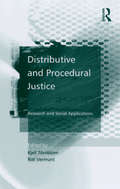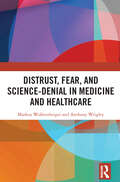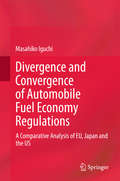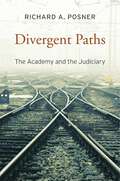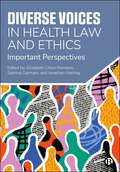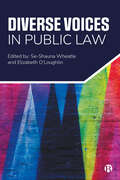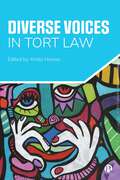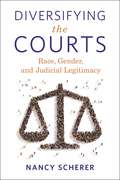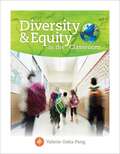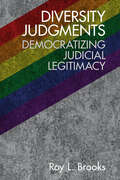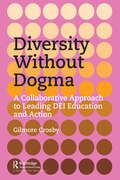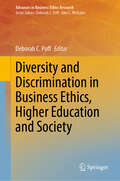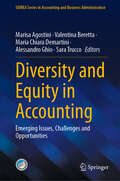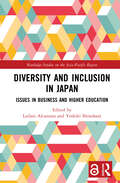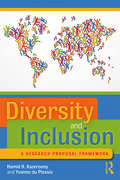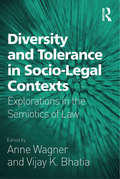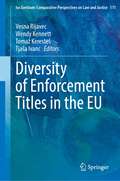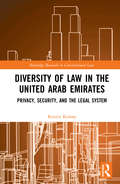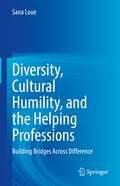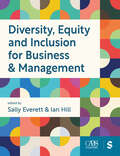- Table View
- List View
Distributive and Procedural Justice: Research and Social Applications
by Kjell Törnblom Riël VermuntThis interdisciplinary and cross-national volume brings together theory and research by prominent scholars within the areas of distributive and procedural justice, not only featuring work within each area separately, as is commonly done, but also showing how combinations of the two justice orientations might operate to affect justice judgments and guide behaviour. Chapters cover various levels of analysis, from intra-personal to interpersonal to group and societal levels. The volume is divided into four sections: distributive justice, procedural justice, distributive and procedural justice, and methodological issues. Each section is subdivided into two parts, basic research and applied research re: current and important societal issues. Each chapter contains an overview of theoretical and empirical research on a particular topic. The volume is designed for use on courses in social psychology, psychology, sociology, political philosophy, and law.
District of Columbia Driver Manual
by District of Columbia Department of Motor VehiclesThis manual provides information on safe driving rules and practices all drivers should know. This manual provides information on all aspects of driving. Be sure to read the entire manual carefully. If you do not read and study this manual, you will not pass the knowledge test required for obtaining a DC driver license. You will not be permitted to refer to this manual while taking the examination.
Distrust, Fear, and Science-Denial in Medicine and Healthcare
by Anthony Wrigley Markus WolfensbergerOver recent decades, the decline of trust, mounting of fears, and increasing denial of science appear as a marked shift of societal attitudes towards many institutions and professionals. This book analyses these developments and looks at their role in medicine and healthcare, both in terms of the patient-physician relationship and for delivering high-quality healthcare, in order to establish why we need trust and what can be done to restore it. The book begins by offering a conceptual analysis and definition of trust, using a ‘pattern definition’ based upon typical features and common usage of the term, as well as the related concepts of hope, fear, and belief. It charts evidence for the decline of public trust in various professions, and then looks at the causes, as well as the accompanying growth of fear and the rejection of science. The study addresses possible options for restoring trust in medicine and healthcare, be it in individual physicians, in hospitals, or in managed care institutions. Written jointly by a medical doctor and an academic specialising in biomedical ethics, the book will be of interest to those working in the areas of biomedical ethics and law, medicine and healthcare, public health, philosophy, sociology, politics, and psychology.
Divergence and Convergence of Automobile Fuel Economy Regulations
by Masahiko IguchiThis book reveals the mechanisms underlying the convergence of car fuel economy regulations in Europe, Japan and the US by drawing upon a constructivist theory of International Relations and law that focuses on business competition and environmental regulations. It offers new understanding of the topic of cars and an issue of climate change, discussing the emerging phenomenon of convergence of fuel economy regulations; addressing the role of business actors in pushing for climate change action; proposing the new model of agency with and beyond states; and providing insightful case studies from Europe, Japan and the US. The opening chapter reviews the automobile industry and global climate change, providing a background for the discussion to follow. Chapter 2, Business Actors and Global Environmental Governance, grounds the discussion in the field of environmental governance. The third chapter is a case study examining the construction and timing of the European Union's climate policies for automobile CO2 emissions, discussing the underlying factors and the actors influencing the policies. The following chapter argues that Japan adopted its stringent fuel economy regulations primarily because of industry competitiveness, motivated by stringent environmental regulations in export markets and encouraged by a tradition of 'co-regulation' and 'corporatism' to enhance the regulations. Chapter 5 asks why the US, the first country to introduce fuel economy regulations, spent two decades in regulatory stagnation, and discusses how recent US fuel economy regulations came to converge with Japanese and European standards. Chapter 6 compares, contrasts and analyzes fuel economy regulations among the three case studies and identifies policy implications for the future climate governance for 2015 and beyond. The final chapter explores applicability of the 'agency with and beyond the state' model to other sectors and to climate governance as a whole.
Divergent Paths
by Richard A. PosnerJudges and legal scholars talk past one another, if they have any conversation at all. Academics criticize judicial decisions in theoretical terms, which leads many judges to dismiss academic discourse as divorced from reality. Richard Posner reflects on the causes and consequences of this widening gap and what can be done to close it.
Diverse Voices in Health Law and Ethics: Important Perspectives (Diverse Voices)
by Elizabeth Chloe Romanis, Sabrina Germain, and Jonathan HerringIlluminating the often-overlooked perspectives of marginalised groups, this essential textbook offers a transformative exploration of health law and ethics. Designed as a replacement for (or complement to) foundational health law texts, the book amplifies the voices of those frequently silenced in teaching materials: racialised communities, ethnic minorities, women, disabled individuals, LGBTQI+ people and those disadvantaged by socio-economic and structural factors. Chapters cover key topics such as abortion, medical negligence, and public health, scrutinising how traditional legal narratives can neglect the nuanced impacts on these diverse groups. Contributors challenge readers to reflect on the production and perpetuation of health inequalities, enriching the curriculum with critical viewpoints. Teaching tools include: - accessible summaries throughout the chapters; - critical reflection questions at the end of each chapter for students and teachers; - further reading lists and links to external resources.. This is an invaluable text that encourages students and academics to engage deeply with the intersections of law, health(care) and social justice. It is an indispensable companion for any health law course, fostering a more inclusive and well-rounded approach to legal and medical education and practice.
Diverse Voices in Public Law
by Se-shauna Wheatle and Elizabeth O’LoughlinTaking a unique and critical approach to the study of Public Law, this book explores the main topics in UK Public Law from a range of underexplored perspectives and amplifies the voices of scholars who are underrepresented in the field. As such, it represents a much-needed complement to traditional textbooks in Public Law. Including insights from a diverse list of contributors, the book: • Enriches students’ understanding of the dynamics that emerge within public law; • Highlights the impact of historical and societal inequities on public law norms; • Demonstrates the ways in which those norms may impact minorities and perpetuate inequalities. With most chapters written by underrepresented or minoritised persons in the field, this text offers students a critical, rich, and insightful approach to public law.
Diverse Voices in Tort Law
by Kirsty HorseyThis captivating book explores uncharted territory in tort law, shedding light on underexplored viewpoints in the field. The collection brings issues of social class, race, gender, marginalisation, vulnerability and harm into conversation with core tort law topics to encourage a more critical examination of the law and its impact on different groups of people. Written by experts in the main areas of tort law from negligence to defamation and personal torts, chapters will: • deepen students’ understanding of the central concepts and practices of tort law; • uncover the power imbalances and privileges that underpin tort law decisions and their impact on lived experiences; • amplify under-represented voices by signposting to the work and ideas of scholars that are less visible in the field. Integrating marginalised perspectives into the curriculum and discourse, this indispensable textbook paves the way for a more inclusive and comprehensive understanding of tort law. Chapter 9 available open access digitally under CC-BY licence.
Diversifying the Courts: Race, Gender, and Judicial Legitimacy
by Nancy SchererExamines the decisions of US presidents to appoint judges from diverse backgrounds to federal courtsIn Diversifying the Courts, Nancy Scherer addresses why presidents choose—or don’t choose—to diversify the federal courts by race, ethnicity, and gender. She explores how and why the issue became a bitter partisan fight in the first place, tracking the controversial history—and politics—of court diversification.Drawing on polls, political experiments, surveys and one-on-one interviews, Scherer illuminates the complicated relationship between diversity and court legitimacy. She shows us how diverse representation can positively impact perceptions of the court among women and racial minorities, while having a negative impact on the perceptions among white people and men. Ultimately, Diversifying the Courts provides insight into the impact of gender, race, and ethnicity on the courts, illuminating some of the major challenges facing the American judicial system in the years that lie ahead.
Diversity And Equity In The Classroom
by Valerie Ooka PangLearning how to use a variety of instructional methods to reach diverse students is vital in schools today. DIVERSITY AND EQUITY IN THE CLASSROOM will teach you how to bridge the gap between theory and practice using a student-centered and culture-centered approach based on a philosophy of social justice and equal outcomes for all students. You will learn why you should think about and value student culture, and how to weave those values into the curriculum and classroom. Guided by social constructivism as the cognitive foundation for learning, the text emphasizes the intersectionality of diverse identities, provides effective methods and strategies that you can use in the classroom to address prejudice and teach culturally diverse students, and prompts you to examine your own biases. Checklists, tips, and tools for classroom use are presented in every chapter and available electronically as Professional Resource Downloads in the online MindTap that supports the text. Important Notice: Media content referenced within the product description or the product text may not be available in the ebook version.
Diversity Judgments: Democratizing Judicial Legitimacy
by Roy L. BrooksThe US Supreme Court's legitimacy-its diminishing integrity and contribution to the good of society-is being questioned today like no other time in recent memory. Criticisms reflect the perspectives of both 'insiders' (straight white males) and 'outsiders' (mainly people of color, women, and the LGBTQ community). Neither perspective digs deep enough to get at the root of the Court's legitimacy problem, which is one of process. The Court's process of decision-making is antiquated and out of sync with a society that looks and thinks nothing like the America of the eighteenth century, when the process was first implemented. The current process marginalizes many Americans who have a right to feel disenfranchised. Leading scholar of jurisprudence Roy L. Brooks demonstrates how the Court can modernize and democratize its deliberative process, to be more inclusive of the values and life experiences of Americans who are not straight white males.
Diversity Leadership in the U.S. Department of Defense: Analysis of the Key Roles, Responsibilities, and Attributes of Diversity Leaders
by Jefferson P. Marquis Jerry M. Sollinger Kirsten M. Keller Beth Katz Maria C. LytellThis study identifies the knowledge, skills, abilities, and other personal characteristics needed in individuals who will be responsible for implementing strategic diversity plans in the Department of Defense (DoD). The authors interviewed more than 60 diversity leaders in industry, the public sector (including DoD), and academia and reviewed relevant scientific literature, education programs, and advertised job requirements.
Diversity Management 2035: Entwicklung einer Zukunftsutopie für Organisationen in Deutschland (BestMasters)
by Lena GrezellaLena Grezella widmet sich mit ihrem Buch der Utopie eines Diversity Managements in Organisationen des Jahres 2035 in Deutschland. In ihrem Text entwirft sie ein wünschenswertes Zukunftsbild, das mögliche und wahrscheinliche gesellschaftliche Entwicklungen in ihre umfassenden Betrachtungen einbezieht. Die Autorin greift im Rahmen eines qualitativen Forschungsdesigns auf Sachverständigenwissen zurück, um Erkenntnisse über das organisationale Diversity Management der Zukunft zu gewinnen. In den Ergebnissen beschreibt sie Veränderungen für organisationales Handeln und den Umgang mit Vielfalt bis in das Jahr 2035, aus denen sich neue Handlungsfelder für das Diversity Management in Deutschland ergeben. Dabei zeigt die Autorin Vorstellungen über die zukünftige strukturelle Verankerung von Diversity Management sowie die Verantwortlichkeit für diversitybezogene Maßnahmen auf. Damit entwickelt sie ein zukunftsorientiertes Verständnis von Diversity Management und stellt die Merkmale vor, die organisationalen Umgang mit Vielfalt zukünftig ausmachen sollten.
Diversity Without Dogma: A Collaborative Approach to Leading DEI Education and Action
by Gilmore CrosbySocial Scientist Kurt Lewin said, "No research without action, and no action without research." Too much of the current DEI (diversity, equity, and inclusion) approach is insight-based instead of action-based. Even though institutional racism is identified as the root problem, the change effort is focused on looking inward for bias instead of taking action to eliminate institutional racism and other isms. A Lewinian approach, in contrast, is balanced. What people think is important, but no more important than what people do. If you bring people together to change things, this will change what people think! We don’t need therapy nearly as much as we need action based on dialogue! Instead of spending your energy soul-searching for evidence in your thoughts and behaviors that you have unconscious biases, this book helps put your energy into doing something practical about racism. To get there, this book uses Lewin’s social science to build a framework for sorting through the many approaches to and positions held on race, racism, diversity, and related topics. While the framework is and must be applicable to any prejudice, systemic or individual, the bulk of this exploration is focused on racism, which to a large degree has become the primary social justice focus of our times. Painfully aware that conversations about race can easily deteriorate into polarization, the author lays a path toward finding common ground.
Diversity and Disagreement: From Fundamental Biases to Ethical Interactions
by Edward T. Cokely Adam FeltzThis book details the discovery and exploration of one of the major scientific revelations that has emerged from the field of experimental philosophy—i.e., that heritable personality traits often predict philosophical diversity and disagreement, and may help explain fundamental philosophical biases. Adam Feltz and Edward T. Cokely provide historical and personal perspectives on this differential approach within experimental philosophy and discuss how theoretical considerations and insights have started to have practical impact on practice in risk communication, law, medicine, public policy, and engineering (e.g., science for informed decision making; the ethics of choice architecture and nudges). The main goal in this book is to provide a theoretical framework for understanding variation in fundamental philosophical intuitions and how that variation informs ethical interaction theory. This is an open access book.
Diversity and Discrimination in Business Ethics, Higher Education and Society (Advances in Business Ethics Research #9)
by Deborah C. PoffThis book engages the reader in a critical and necessary examination of the nature and range of behaviours that comprise diversity and discrimination in business and society. Discrimination and diversity are vitally important topics in the workplace as the manifestation of discriminatory practices leads to disfunction and a lack of effectiveness and efficiency in workplace settings. The chapters in this text not only conceptualize and clarify the meanings of diversity and discrimination but, as well, nicely unpack various debilitating features of the phenomenon and its various practices. This book is of particular interest to faculty teaching in schools of business, as well as researchers in business ethics and business management. As such, it provides an excellent venue for the exploration of the various negative impacts of diversity and discrimination.
Diversity and Equity in Accounting: Emerging Issues, Challenges and Opportunities (SIDREA Series in Accounting and Business Administration)
by Sara Trucco Alessandro Ghio Marisa Agostini Valentina Beretta Maria Chiara DemartiniThis book discusses the role of diversity and equity in accounting, management control, governance, and auditing. These issues are increasingly relevant in both national and international debates. The volume analyzes recent literature and examines the role of diversity and equity as fundamental elements of corporate culture, determinants of the corporate growth model, and social justice. After framing the topic theoretically, the book conducts field analyses, collecting both secondary and primary data through qualitative and quantitative research methods, such as interviews, surveys, business case analyses, and documentary analyses of corporate practices on diversity and equity. The book provides an in-depth understanding and offers practical insights into the best (and worst) practices in diversity and equity within these fields. It will appeal to researchers in the social accounting domain and professionals seeking to integrate diversity and equity into business practices. The results presented are also relevant to policymakers who need to understand how to incentivize or regulate practices concerning diversity within corporate contexts.
Diversity and Inclusion in Japan: Issues in Business and Higher Education (Routledge Studies on the Asia-Pacific Region)
by Lailani Alcantara and Yoshiki ShinoharaAlcantara, Shinohara, and their contributors evaluate the current state of diversity and inclusion (D&I) within business and higher education in Japan, and the importance of D&I to the growth of Japan’s economy and the enrichment of its society. Japan is widely understood to be a homogenous and patriarchal society, and while this is changing and was never wholly accurate, it certainly faces challenges in becoming more diverse and inclusive, particularly in its business and higher educational cultures. Grounded in research and offering best practices, the chapters in this book analyze critical issues relating to D&I in Japan at the individual, organizational, and industry levels. They present both a longitudinal analysis of the evolution and performance outcomes of D&I policies in Japanese corporations across industries, and rich studies of different underrepresented groups in Japan. These groups include immigrants, women, and people with disabilities. The contributors prescribe policies for promoting D&I in higher education, within businesses and at the governmental level. This book is an essential contribution to D&I discourse in the Japanese context that will be of great value to scholars of Japanese society and business, and an important extended case study for those looking at D&I more widely.
Diversity and Inclusion: A Research Proposal Framework
by Hamid H. Kazeroony Yvonne du PlessisAimed at assisting doctoral candidates and early-career researchers and their supervisors globally, this book is the first of its type to address the challenges faced by students when proposing new programs of research in the disciplines of gender, race, identity, indigeneity, and diversity within management and business. The problems researchers face derive from a lack of familiarity with the needed alignment of the methodology, conceptual framework, and the nature of epistemologies used in creating a coherent proposal. This results in project delays and unnecessary time in review as doctoral students and committees attempt to provide the required alignment. Essential reading for students and faculty engaged in these fields of study, the book provides a practical guide on how to navigate through these challenges and to arrive at a workable proposal that meets the requirements of the academy. To assist doctoral students in conducting their research, the book provides narratives that illustrate the complexities of researching gender, race, identity, indigeneity, and diversity in broad terms. It explains the importance of such research in creating positive social change and helping students identify the appropriate conceptual framework, align the problem statement with a purpose, construct the research question and the nature of the study, and identify the correct method to conduct the research. An essential guide for students and doctoral researchers, this book explains the dominant and marginalized epistemological orientations to acquaint doctoral researchers with the effects of their selections on the outcomes of their research. It provides guidance as to the appropriateness of quantitative or qualitative methods based on the selected epistemology and the problem statement.
Diversity and Tolerance in Socio-Legal Contexts: Explorations in the Semiotics of Law
by Vijay K. BhatiaWhy is there so much resistance to recent issues of tolerance and diversity? Despite efforts of the international community to encourage open-mindedness, recent attempts at international, political and economic integration have shown that religious, cultural and ethnic tolerance and diversity remain under threat. The contributions in the volume reflect the growing importance of these issues and why resistance is so widespread. Part I addresses the relationship between the language of law and its power, whilst Part II explores the interplay of tolerance and diversity under visual, legislative and interpretative perspectives. This collection as a whole offers a combination of varied perspectives on the analysis, application and exploitation of laws and will be a valuable source of information for those interested in the general area of language and the law.
Diversity in Intellectual Property
by Calboli, Irene and Ragavan, Srividhya Irene Calboli Srividhya RagavanThis book aims to create an interface between intellectual property and diversity - including cultural, biological, religious, racial, and gender-based diversity. While acknowledging that the historical rationale for intellectual property protection is based on theories of utilitarian incentives and property rights, the authors of this volume assert that the current intellectual property framework is not incompatible with including diversity as part of its objectives. Through its various themes, this book delves into the debate of whether such inclusion can be made possible and how intellectual property norms could be effectively used to protect and promote diversity. In this volume, leading scholars address ongoing regional, national, and international debates within the contexts of diversity, the existing legal framework, and the broader political and economic climate. The authors tackle such wide-ranging topics as the prohibition against trademarking slurs and concepts of intellectual property in ancient Indian texts.
Diversity of Enforcement Titles in the EU (Ius Gentium: Comparative Perspectives on Law and Justice #111)
by Vesna Rijavec Wendy Kennett Tomaž Keresteš Tjaša IvancThis book examines the diversity of enforcement titles in cross-border debt collection, focusing on the types, structure, contents and effects of enforcement titles. It offers a comprehensive overview of judgments, court settlements and authentic instruments from a variety of EU Member States. It primarily employs the comparative legal method to draw conclusions on commonalities and differences, as well as prospects for future approximation of laws. The premise of the research is rooted in the finding that national authorities of EU Member States continue to treat enforcement titles from other Member States with reservations and mistrust despite being committed to the principle of mutual trust. The book identifies the issues of mistrust stemming from the diversity of enforcement titles. The research is based on a rich database of national reports compiled during the course of several large-scale EU Justice Projects. Divided into five parts, the book offers first some general considerations and presents attempts at a systemisation of enforcement titles. The following parts are then devoted to more specialised approaches toward the different types of enforcement titles. However, the connecting line between all parts of the book are the considerations of cross-border enforcement in the EU (and in a limited manner with third States). Herein, research also addresses critical factors regarding the free movement of judgments in the EU, including those of lis pendens and related actions. This book provides a valuable contribution to the Theory of European Civil Procedure. Since it is based on a comparative approach and employs both empirical and doctrinal viewpoints, it should also greatly benefit practitioners involved in cross-border dispute resolution. Overall, the findings should be of interest to a broad audience, including policymakers, judges, practitioners and scholars.
Diversity of Law in the United Arab Emirates: Privacy, Security, and the Legal System (Routledge Research in Constitutional Law)
by Kristin KamøyThis book examines the law and its practice in the United Arab Emirates (UAE). The objective is to understand the logic of the legal system in the UAE through a rounded analysis of its laws in context. It thus presents an understanding of the system on its own terms beyond the accepted Western model. The book shows how the Emirati law differs from the conventional rule of law. The first section of the book deals with the imperial, international, and cultural background of the Emirati legal system and its influences on some of the elements of the legal system today. It maps the state’s international legal obligations according to core human rights treaties showing how universal interpretations of rights may differ from Emirati interpretations of rights. This logic is further illustrated through an overview of the legal system, in federal, local, and free zones and how the UAE’s diversity of legal sources from Islamic and colonial law provides legal adaptability. The second section of the book deals mainly with the contemporary system of the rule of law in the UAE but at times makes a detour to the British administration to show how imperial execution of power during the British administration created forerunners visible today. Finally, the debut of the UAE on the international scene contributed to an interest in human rights investigations, having manifestations in UAE law. The work will be a valuable resource for researchers and academics working in the areas of Comparative Constitutional Law, Legal Anthropology, Legal Pluralism, and Middle Eastern Studies.
Diversity, Cultural Humility, and the Helping Professions: Building Bridges Across Difference
by Sana LoueToo often, cultural competence training has led to the inadvertent marginalization of some individuals and groups and the reinforcement of existing stereotypes. This text explores the concept of cultural humility, which offers an exciting way forward for those engaged in the helping professions. In contrast to cultural competence, cultural humility challenges individuals to embark on a lifelong course of self-examination and transformational learning that will enable them to engage more authentically with clients, patients, colleagues, and others. The book traces our understanding of and responses to diversity and inclusion over time with a focus on the United States.Topics explored include:Us and Them: The Construction of CategoriesCultural Competence as an Approach to Understanding DifferenceTransformational Learning Through Cultural HumilityFostering Cultural Humility in the Institutional/Organizational ContextCultural Humility and the Helping ProfessionalThe book presents examples that illustrate how the concept of cultural humility can be implemented on an institutional level and in the context of individual-level interactions, such as those between a healthcare provider or therapist and a client.Diversity, Cultural Humility, and the Helping Professions: Building Bridges Across Difference is essential reading for the health professions (nursing, medicine), social work, psychology, art therapy, and other helping professions.
Diversity, Equity and Inclusion for Business & Management
by Ian Hill Sally EverettDiversity, Equity and Inclusion for Business & Management is a comprehensive and accessible guide to the evolving landscape of DEI in the discipline. Developed in collaboration with the Chartered Association of Business Schools and written by experts in their fields, this book offers a unique approach, with discipline-focussed chapters that cover Strategy, Leadership, Organisational Behaviour, Marketing, Accounting, Finance and more. As you read about how issues of social justice, diversity, and inclusion relate to your studies and future careers, you will be supported by a range of learning features, including global case studies, critical reflections, and practice questions. This book is essential reading for students of business and management taking modules in DEI and diversity management, as well as those who are interested in responsible business practice. Sally Everett is Professor of Business Education and Vice Dean (Education) at King’s Business School, King’s College London Ian Hill is a Lecturer in Work and Organisations (Education) at King’s Business School, King’s College London
